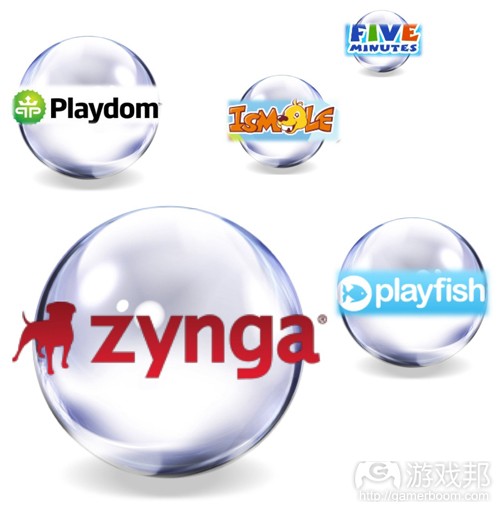当今社交游戏市场的6个重要发展趋势
作者:Lee Hower
社交游戏市场在过去三年里取得了巨大的发展。在这个领域里有很多迅速发展着的公司,特别是Zynga,但是我们往往会忘记这家大公司在2007年7月份才刚成立。
整个社交游戏产业现在已明显进入了一个新的发展阶段,即制度化。在这里我所说的制度化并不是指那些合并行为,如EA收购了Playfish,迪士尼收购了Playdom,Zynga获得了谷歌和日本软银的投资以及数不清的小规模合作等,而是整个社交游戏产业里一种更为长期的变化,即不再只停留于现在或者过去的发展,而是朝着一个更远大的目标,向其它游戏领域(即电脑游戏,单机游戏,掌机游戏等)发起挑战。
1)产品价值正在上升:我所接触过的每一位社交游戏开发者都表示他们的产品价值正在提高。为了提供给用户更丰富且更有吸引力的游戏,游戏开发公司不得不面对日益提高的开发成本,而同时还需要面临许多大大小小的行业竞争者。但是或许这也能帮助社交游戏吸引到更多其它平台或者其它类型游戏的玩家。
2)低/零成本获取用户的日子一去不返:随着Facebook等社交网站改变了游戏内的互动方式(游戏邦注:这里指Facebook限制游戏的病毒式传播),这些改变明显减少了低层本的病毒式营销的发展,即使是传统上非常廉价的Facebook付费广告,也开始转变为效果更好收费较高的CPA广告。但即便这样也仍有可能吸引到无数付费较少的玩家,他们也为游戏的盈利带来了小额的利润。但如果想制作一款DAU达到100万以上的巨作,开发商们就不得不投入庞大的市场营销预算。
3)IP(知识产权)重要性日益突出:迪士尼并不是因为Playdom庞大的用户基础或者其雄厚的收入来源才做出收购决定。Playdom是一家拥有多个社交游戏开发工作室的控股公司,这些工作室有些是自然发展而起而有些是通过收购获得。迪士尼收购了Playdom这家美国第二大社交游戏开发商,借此希望能够扩大旗下大量卡通形象的IP(如Mickey,Buzz Lightyear等)影响力,并创造属于自己的品牌游戏。EA也采取了类似的行动,掌握了大量体育联赛的游戏授权。以前的很多游戏将会被加入一些新元素(游戏邦注:如现在的电影,体育明星,书籍等)进行重新改造,同时很多游戏开发者也将会改造现有的游戏,并推出受欢迎的新版本。就像电脑,掌机等游戏平台,网络和手机社交游戏也将发生转变,并开始利用现有的IP并发挥其最大作用。
4)Zynga仍然很强大:社交游戏的忠实粉丝都知道,《Farmville》等Zynga游戏已经多次打破了游戏快速增长的最高记录。但是最令人惊讶的还是,日活跃用户指数排名第一的社交游戏公司Zynga甚至远超于排名第2至第30这29家公司日活跃用户的总数。这种强大的市场占有率足以和谷歌媲美。Marc Pincus以及整个Zynga团队都很清楚如何做才能继续维持这种火热的场面。他们拥有足够的人员和财力以应对上述1)-3)大趋势,但是如今的市场竞争已经发生了显著的变化,而这家公司也正在竭尽全力,试图让自己不再一味地依赖于Facebook的庇护。
5)“硬核”社交游戏崛起:可以说,以前绝大部分电子游戏产业主要是受硬核游戏玩家驱动而非休闲游戏玩家。一开始休闲游戏主要侧重于用户特点和游戏内容,而随着网络社交游戏世界的到来,休闲游戏发生了变化。我相信在不久的我们会看到越来越多的网络和手机社交游戏将把硬核游戏玩家作为目标用户,并且不失原有的休闲游戏玩法。但由于越来越多社交游戏已开始锁定其他平台的玩家,“休闲”与“硬核”玩法之间的界线将日益模糊。
6)周边产业的兴起:Offerpal,TrialPay等营销公司看到了社交游戏产业的潜力,我认为在不久的将来这一领域也会培养出一批大型公司或初创企业。专门针对社交游戏的交叉推广平台、付费系统,甚至是游戏开发引擎公司也将从这个市场的繁荣发展中受益。
社交游戏的淘金热还未结束,不论是大型游戏开发者还是小开发商都拥有巨大的发展机遇。但是我们都很清楚,当整个产业发展到一个新的阶段时,社交游戏生态系统里的每一分子都需要尝试做出改变。
游戏邦注:原文发表于2010年7月29日,所涉数据和世界均以当时为准。(本文为游戏邦/gamerboom.com编译,如需转载请联系:游戏邦)
The Institutionalization of Social Games… Get Used to It
The social games market has exploded onto the startup scene in the last three years. We all know about the remarkable growth of companies in this space, yet we tend to forget that Zynga was founded in July 2007.
But the social games business has clearly entered a new phase of institutionalization. I don’t mean just consolidation via EA acquisition of Playfish, Disney acquisition of Playdom, huge strategic investments from Google & SOFTBANK in Zynga, and plus countless smaller consolidations. I mean there are secular shifts going on in the industry which mean the land grab of the recent past is beginning to wane, and the near future of social games may start to mirror other gaming waves (PC, console, handheld, etc).
1) Production Values Going Up – Every social game developer I speak to agrees that production values are increasing. Consumers should benefit from richer, more engaging games but obviously development costs are going up as game companies large and small engage in an “arms race” with their competitors. This may also have the potential to shift gamer attention from other platforms or other forms of entertainment.
2) Low/No Cost Customer Acquisition Is Largely Gone – This has been true for some time (6-12mo), as social networks like Facebook changed the way in-game activity could be published to status feeds. These changes dramatically impacted zero-cost viral growth, but even paid acquisition through FB ads has transitioned from what was once a very cheap arbitrage to materially higher CPAs. It’s still possible to attract hundreds of thousands of players relatively inexpensively, which can produce an attractive small scale revenue stream (low 7-figure annualized) for games that monetize reasonably well. But to create a breakout hit w/ 1M+ DAUs now requires a real marketing budget.
3) IP Starts to Matter – Disney didn’t buy Playdom for a huge user base or massive current revenue stream. Playdom had essentially built up a holding company of several social game studios, both through organic growth and acquisition. Disney bought the second largest social games labor force in the US, through which they will pump their massive portfolio of IP (Mickey, Buzz Lightyear, and the rest) to create branded games. EA is doing the same with their licenses from sports leagues, Playdom had perviously lined up a deal with World Series of Poker (http://blog.games.com/2010/07/28/playdoms-poker-palace-gets-world-series-of-poker-branding/), and the trend will continue. There’s still lots of opportunity for “original” games not developed on existing movies, sports stars, and books and plenty of developers will continue to clone each others’ games in popular genres. But just like PC, console, and other game platforms, web & mobile social games will transition from being largely original to greater use of existing IP.
4) Zynga is Still Huge – Followers of the social games space know that Zynga has repeatedly broken records for the rapid growth of games like Farmville and others. But the most staggering stat is that measured by daily active users (DAUs), the #1 social game company (Zynga) is larger than the #2-#30 companies combined. That’s Google-like market share dominance. Marc Pincus and the rest of the Zynga team clearly know how to run a studio that can continue to crank out hits. They have the human and financial capital to deal with trends #1-3 above, but the nature of the competition is clearly different now and the company is working very hard to diversify it’s dependency on Facebook.
5) “Hardcore” Social Games Emerge – Most prior waves of the video game business have been driven initially by “hardcore” players rather than a “casual” mass market. Casual is best thought of both as a demographic and a gameplaying context… but the browser-based social games world has been flipped, whereby “casual” led the evolution. I think you’ll start to see more web and mobile social games which are targeted to “hardcore” players albeit often still in a “casual” gameplay setting. But the latter will start to blur, with more social games targeted towards gamers who currently spend far more time on other platforms.
6) Picks & Shovels Businesses – The online offer companies (Offerpal, TrialPay, et al) pivoted neatly to serve the social games space, but I predict we’ll see more picks and shovels type businesses emerging in this sector (either within bigger companies or startups). Cross-promotion platforms, payment systems, maybe even game engines specifically designed for the social games business will come down the pike.
The gold rush isn’t over, and there’s still huge opportunities for lots of new social game franchises to be built by both small and big developers. But we’re pretty clearly moving into the middle innings here and everybody in the social games ecosystem is furiously trying to adapt.(source:agilevc)








































 闽公网安备35020302001549号
闽公网安备35020302001549号